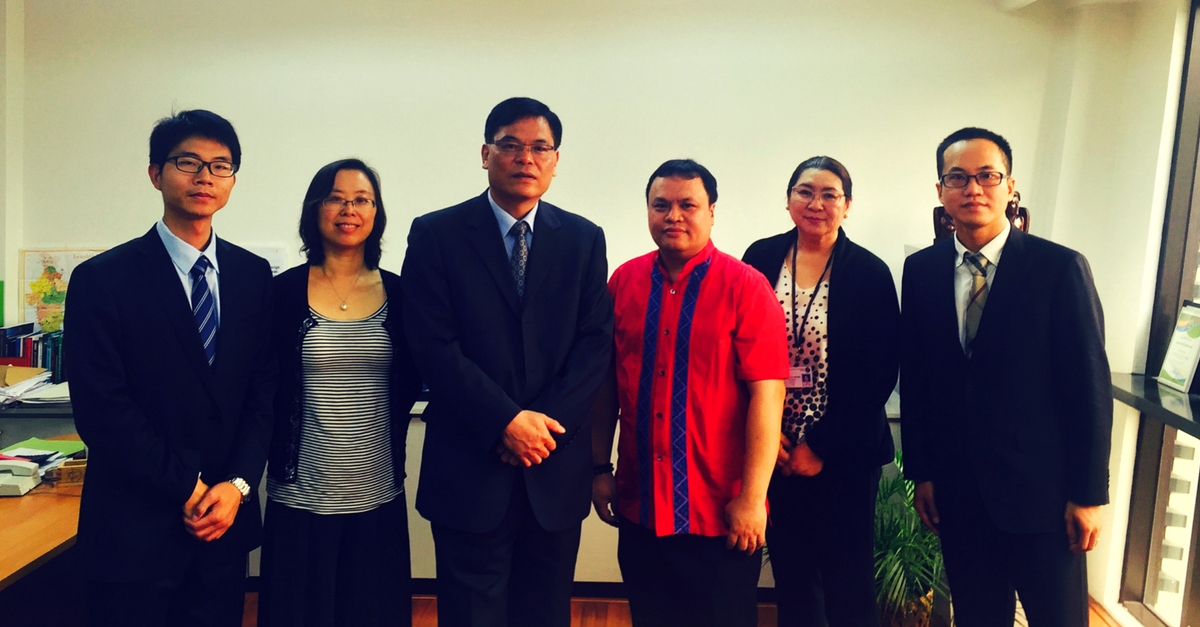 Dean Joefe Santarita (3rd from right) and Professor Baviera (2nd from right) of the UP Asian Center with scholars from the China Institutes for Contemporary International Relations.
Dean Joefe Santarita (3rd from right) and Professor Baviera (2nd from right) of the UP Asian Center with scholars from the China Institutes for Contemporary International Relations.
Last September 12-13, 2016, Asia Pacific Pathways to Progress Foundation Inc. (APPFI) partnered with the University of the Philippines Asian Center in hosting a delegation of four scholars from the China Institutes for Contemporary International Relations (CICIR). The delegation visit is a part of the Memorandum of Agreement between UP and CICIR in 2014, aiming to intensify and reap the benefits of academic and Track 2 diplomacy exchanges.
Dean Joefe Santarita of the Asian Center delivered welcome remarks for a roundtable held on 12 September 2016. This is the first exchange between the university and the Chinese think tank after the release of the arbitration results regarding the maritime claim overlaps of the two countries in the South China Sea. It will be recalled that the arbitral tribunal last July 12 issued an award that was perceived to largely favor the Philippines, and which China has said it would not accept.
The September 12 roundtable discussion involved academics and staff from selected government units, revolving around how to move Philippines-China relations forward after the arbitration, and the positions of the new administration of Pres. Rodrigo Duterte towards China. Aside from retired officials from the Departnment of Foreign Affairs and the Department of National Defense, analysts and researchers from the armed forces and coast guard as well as other maritime security agencies, participated.
APPFI also organized a brief dialogue between CICIR and China watchers from the private sector, where both sides underscored that the way to establish better relations is through trade and investments, and that other possible areas of cooperation should be pursued in the disputed areas, such as fisheries and marine environment conservation. The dialogue was hosted by Mr. Jeffrey Ng of the Astoria Plaza.
One highlight of the visit was the exchange of ideas among a small group of analysts that was co-organized with the Foreign Service Institute and held at the Department of Foreign Affairs. The discussions surfaced the need to take concrete actions and to look at areas where cooperation is easily achievable, particularly in the regional commons. Roundtable discussions like these highlight the importance of open and fruitful exchanges among the Track Two communities in the two countries.
Based in Beijing, the China Institutes of Contemporary International Relations (CICIR) is a "comprehensive research institution for international studies. It was officially established in 1980, and was renamed in 2003. The organization mainly focuses on international strategy, international politics and economy, global and regional security, and the political, economic, diplomatic and social issues of major powers. Presently, CICIR consists of 11 institutes, two research divisions, eight research centers and several administrative departments" (China.org.cn).
This write-up is a very slightly modified version of a press released titled APPFI, UP Asian Center cooperate in facilitating Chinese think tank exchanges with Philippine government agencies, originally published in the website of the Asia Pacific Pathways to Progress Foundation, Inc.
The UP Asian Center offers M.A. programs in Asian Studies with four fields of specialization: Northeast Asia, Southeast Asia, South Asia, and West Asia. The Center also has an M.A. program in Philippine Studies that allows students to major in Philippine society and culture, Philippine foreign relations, or Philippine development studies. The Center offers a Ph.D. program in Philippine Studies in conjunction with the College of Arts and Letters and the College of Social Sciences and Philosophy. Get an overview of these programs. The Asian Center also houses a peer-reviewed, open-access journal, Asian Studies: Journal of Critical Perspectives on Asia. It has published several books and monographs, and hosts or organizes various lectures and conferences.

